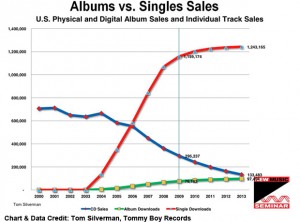Music and technology are two key aspects of society that are forever changing. As advancements in technology are made, the music industry will have to react. The industry has dealt with significant changes before, from the popularization of iTunes and digital downloading to increased accessibility of music creating resources.
With today’s technology, it is possible for anyone with a computer to produce and record practically any type of music.
On one hand, this allows for the possibility of artists to create his or her own niche and break out on Internet platforms such as YouTube. On the other, it can be difficult for artists to separate themselves from the pack.
Antonio “Tone” Johnson, an aspiring rapper in Rocky Mount, North Carolina, said that the competition creates a dangerous “every man for themselves” attitude throughout the industry. Because of this mind-set, Tone said, it is important to link up with other artists that are striving toward the same goals.
In a business that is often about whom you know, it is essential to network with likeminded individuals.
Tone also mentioned the tricky scenario of having to spend money on beats, videos and promotion in order to make money.
Daniel Ross, a Western student that was signed to a record label about 3 years ago at the age of 18, expressed similar challenges in the music industry.
Before getting signed, Ross focused on promotion and paying money for advertising in order to get his music heard. Once signed, however, the label took care of promotion-related expenses.
Though, spending issues aside, being signed does not come without its challenges. In Ross’ experience, it is still all about the money.
“When I was signed to the label, most of the money went to the label,” said Ross. “The people with the most money control what’s going on.”
Ross said that the label interfered with the type of music that they wanted to make. The label wanted to change the band’s music to maximize their own profits instead of getting behind the band and what they wanted to do.
According to Digital Media Specialist at Western, Jason Melvin, it is now more important for artists to have a hit song rather than a good album.
Searching for the big hit, A&R’s can overlook a lot of talent. Ross pointed out the differences between Facebook and the no-longer-popular Myspace. With Myspace, labels used to be able to see exactly how many people were listening to an artist’s music and what type of impact they were having locally. Facebook, for the most part, has yet to pick up where Myspace left off when it comes to music.
Once labels are doing more to find local talent, artists can spend less precious resources trying to promote their music to the rest of the country. Artists could spend more time on perfecting their craft and working on improving rather than focusing on the business side of music.
“Look at how artists are doing locally, and that can tell labels how they can do nationally and beyond,” said Ross. “If A&R’s paid more attention to what’s going on locally, it would take a lot of stress off of trying so hard to get noticed.”
Duane “M.E.C.C.A.” Johnson Jr. is another artist who is determined to work on his craft and gain recognition without conforming to what a record label might want to see. Born in North Carolina, M.E.C.C.A., which stands for “Man Even Christ Could Admire,” started his journey in 2002, using music as a therapy and hoping to spread positivity to as many ears as possible.
M.E.C.C.A. agreed that the concentration on money has a damaging impact on the artistry.
“It [the music industry] is fake, full of actors and people who base their art on entertainment and fabrication instead of being real and showing growth,” said M.E.C.C.A. Record labels, looking at the bottom line, care little about whether or not music is destructive on society’s young minds.
M.E.C.C.A. thinks the people should try their best to support genuine artists to combat the “money rules the world” mentality of the industry.
“I do not wish to be the rapper who entertains, but the rapper who can be relatable. The biggest struggle I face being the artist that I am is being valued as the artist that I am,” said M.E.C.C.A. “I stepped in this for respect.”
M.E.C.C.A. will continue to trying to reach as many hearts and minds as he can while giving back to the community when possible. Ross is no longer with that record label and is focusing on graduating, but aspires to change the flow of the music industry and change the way labels reach out to artists. Tone wants to build an empire of his own so that he can help his family and friends while living the “good life.”
Thousands of other artists across the country, motivated by distinctive goals in varying genres, face similar challenges in a constantly changing music industry that often revolves around money over expression.
In the end, the journey and dream to make an impact through music, makes it all worth it.
You can hear M.E.C.C.A. further explain his story and speak on the music industry below:



